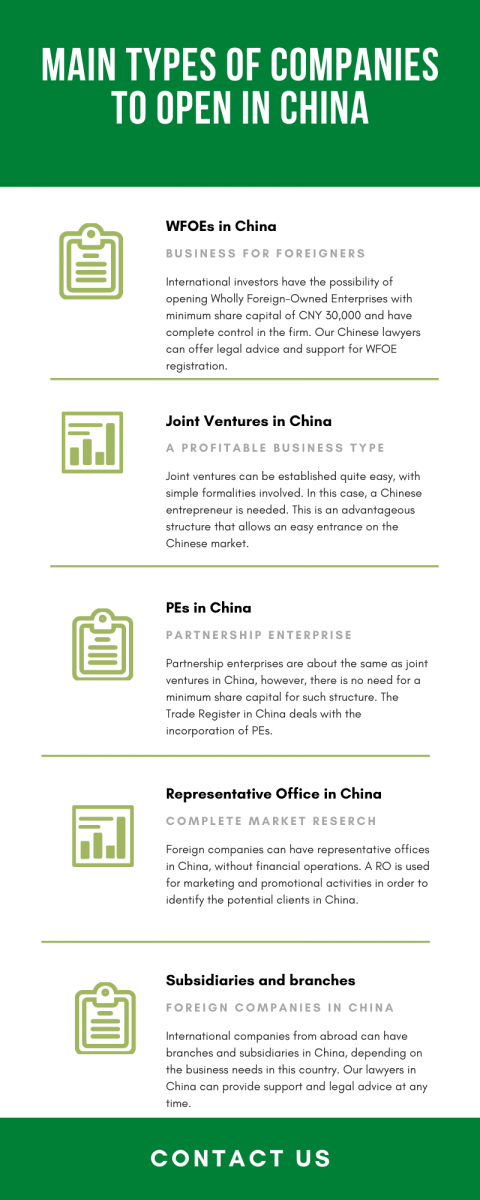Businessmen or foreign investors who wish to open a company in China can be advised and legally counseled by our Chinese lawyers who can offer detailed information and guidance about the entire process. Among the preferred types of companies in China, investors choose to open a Partnership Enterprise (PE), a Joint Venture (JV), a Wholly Foreign Owned Enterprise (WFOE), a State-Owned Enterprise (SOE), a Private Enterprise (PE). You can also choose to open a Representative Office (RO) in China.
Immigration to China can also help you become the owner of a Wholly Foreign Owned Enterprise.
Table of Contents
Details about a WFOE (Wholly Foreign Owned Enterprise) in China
WFOE (Wholly Foreign Owned Enterprise) is a limited liability company, entirely owned by a foreign investor, and one of the most agreed types of companies in China. To open sucha company, the investor or the representative of the company needs to prepare the incorporation certificate, Articles of Association with the approval of the Chinese Consulate, bank statements, details about the registered capital, information about the operational structure, the VAT certificate, the import and export licence, and the registered name with SAIC (State Administration of Industry and Commerce. Also, the Ministry of Commerce and Foreign Economical Cooperation Bureau in China will grant the approval certificate, in order to start your business. WFOE (sometimes incorrectly WOFE) is the most popular business structure in China and therefore, it is recommended to have in mind more details about this structure:
- RMB 30,000 is the minimum share capital which needs to be deposited in a local bank account at the time the company is registered.
- A legal representative and a board of directors need to be appointed.
- A feasibility report needs to be created by investors looking for business in China.
- The registration for tax purposes and social contributions is mandatory for WFOEs in China.
International investors in China should note that they have complete control in the company and there is no need for establishing a partnership with a local entrepreneur. Also, the registration of trademarks and patents should be in their attention as soon as they decide for business in China. In matters of profits, it is important to know that there is no restriction for the repatriation of revenues and there is no need to wait for specific approvals. Even though the WFOE can be easily established in China, the legal support of our Chinese attorneys will prove quite beneficial and that because it is necessary to skip the problems related to the applicable legislation, business formation or even language barriers. Here is an infographic about the available types of companies in China:

How do I open a JV (Joint Venture) in China?
A Chinese Joint Venture is created between an overseas investor and a Chinese enterprise or individual, with both investment contributions and shared profits. Chinese and foreign parts need to settle for the control and the activities of the company, due to specific terms, rules and regulations. This type of company allows a foreign investor to easily enter the Chinese market and make profitable activities. Our lawyer in China can provide you with information and details about a Joint Venture in China and about how to register one.
We can also assist in immigration to China through business registration.
Opening a PE (Partnership Enterprise) in China
A Partnership Enterprise has the same characteristics as JV in China, where persons can do business in different domains in the country. In order to open such a company in China, you will need to register with the Trade Register in China, without needing the Ministry of Commerce endorsement. The best part is that a Partnership Enterprise is not obliged to pay the income tax, and there is no need to provide a minimum share capital in order to open this type of company.
Details about an RO (Representative Office) in China
If you are interested in market research, maintain business relations, present products on the Chinese market and to develop new commercial associations, then you should open a Representative Office. It is good to know that this kind of business cannot perform any commercial activity. A Chinese Representative Office can speak in the name of the parent company and can promote and introduce its products to the market.
Short details about the Trade Register in China
As the name says, the Trade Register in China is the institution in charge of company registration of any kind. This means that both local and foreign entrepreneurs can incorporate their firms with the help of the Chinese Trade Register, regardless of the chosen business structure. Partnerships, joint ventures, joint stock companies, limited liability companies and sole proprietorships need to be incorporated with the Trade Register in China. The first thing to do when opening a company in China is to verify the business name with the Trade Register and skip the situations of having the same company name with an existing one. It is good to know that anyone can freely access the company name database in China, also called the “Guiding Opinion”, as this option is made public for many years. The incorporation process of a company in China comprises several steps and among these, the submission of the pre-approval form provided at the Trade Register. Luckily, foreign entrepreneurs can obtain the legal support of our team of lawyers in China when it comes to name verifications, pre-approvals and so on. Feel free to appoint us as legal representatives for your future company in China and let us handle the incorporation requirements with the Trade Register, with the help of a power of attorney. Our advisors can also help you apply for an EORI number.
Our immigration lawyers in China can guide you on how to apply for business permits.
Can I open a subsidiary or a branch in China?
Yes, both structures are available in China and can be established by large companies from abroad. First of all, it is recommended to pay attention to the features of each structure, in order to make the proper choice for your future activities in China. For instance, subsidiaries can be chosen by those wanting complete flexibility and control in the company, as this is a legal independent structure that can have other activities too, besides the ones imposed by the parent company. In the case of branches, these are partially independent, do not have a legal entity and must carry only the activities of the parent company. In matters of advantages of both branch and subsidiary, we note the fast incorporation and registration, a series of tax benefits, the possibility of hiring local staff and activating in most of the important business sectors in China. No matter if you want to establish a branch or a subsidiary in China, the advice is the same, and that is to talk to one of our Chinese attorneys and solicit complete legal advice and support.
You can rely on our immigration lawyers in China if you want to move here and manage your business.
Why make investments in China
It is a well-known fact that China is a huge emerging market, has a solid and dynamic economy, and a multitude of business development possibilities in all the prolific sectors. The low labor costs, the experienced and trained workforce, the ease of doing business and the tax structure are definitely appealing to international investors in China. Below we have gathered data, statistics and information about the business and the economy in China:
- • USD 139,043 million was the FDI inward flow for China in 2018;
- • the “2019 Doing Business” report ranks China 46th out of 190 worldwide economies;
- • China is the second most attractive business destination for multinational companies;
- • approximately 36,000 of companies established with foreign funds have been registered in China in 2018.
For a better understanding of the rules and regulations related to the registration and the proper function of different types of companies in the country, you are invited to contact our law firm in China.

